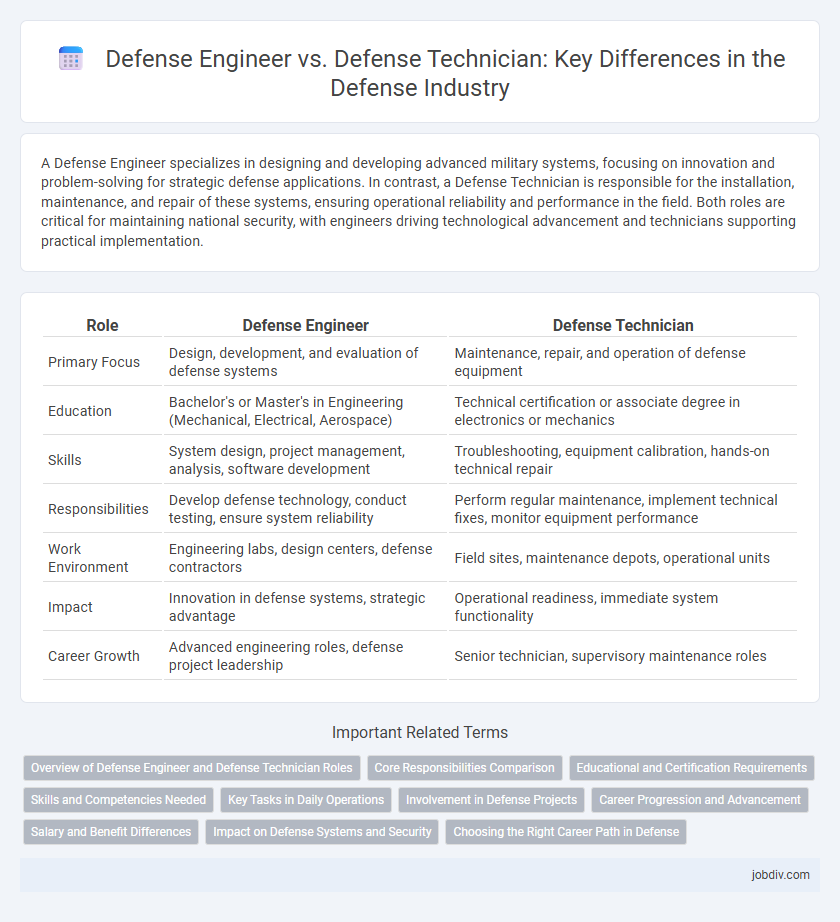A Defense Engineer specializes in designing and developing advanced military systems, focusing on innovation and problem-solving for strategic defense applications. In contrast, a Defense Technician is responsible for the installation, maintenance, and repair of these systems, ensuring operational reliability and performance in the field. Both roles are critical for maintaining national security, with engineers driving technological advancement and technicians supporting practical implementation.
Table of Comparison
| Role | Defense Engineer | Defense Technician |
|---|---|---|
| Primary Focus | Design, development, and evaluation of defense systems | Maintenance, repair, and operation of defense equipment |
| Education | Bachelor's or Master's in Engineering (Mechanical, Electrical, Aerospace) | Technical certification or associate degree in electronics or mechanics |
| Skills | System design, project management, analysis, software development | Troubleshooting, equipment calibration, hands-on technical repair |
| Responsibilities | Develop defense technology, conduct testing, ensure system reliability | Perform regular maintenance, implement technical fixes, monitor equipment performance |
| Work Environment | Engineering labs, design centers, defense contractors | Field sites, maintenance depots, operational units |
| Impact | Innovation in defense systems, strategic advantage | Operational readiness, immediate system functionality |
| Career Growth | Advanced engineering roles, defense project leadership | Senior technician, supervisory maintenance roles |
Overview of Defense Engineer and Defense Technician Roles
Defense engineers specialize in designing, developing, and testing advanced military systems and technologies to enhance national security. Defense technicians focus on installing, maintaining, and repairing defense equipment, ensuring operational readiness and functionality in the field. Both roles require technical expertise, but engineers emphasize innovation and system design, while technicians prioritize hands-on support and maintenance.
Core Responsibilities Comparison
Defense engineers primarily design, develop, and test advanced defense systems, focusing on complex problem-solving and innovation in weaponry, vehicles, and communication technologies. Defense technicians specialize in the installation, maintenance, and repair of defense equipment, ensuring operational functionality and adherence to safety protocols. Engineers engage in system analysis and prototype development, whereas technicians execute hands-on troubleshooting and support for deployed defense hardware.
Educational and Certification Requirements
Defense Engineers typically require a bachelor's degree in engineering disciplines such as aerospace, mechanical, or electrical engineering, along with professional certifications like Certified Systems Engineering Professional (CSEP). Defense Technicians often need an associate degree or technical diploma in electronics, mechanics, or related fields, complemented by certifications such as CompTIA Security+ or manufacturer-specific technical certifications. Both roles emphasize ongoing training to stay current with defense technologies and compliance standards.
Skills and Competencies Needed
Defense Engineers require advanced skills in systems engineering, software development, and project management to design and implement complex defense technologies. Defense Technicians need strong competencies in hands-on equipment maintenance, diagnostics, and technical troubleshooting to ensure operational readiness of defense systems. Both roles demand expertise in compliance with military standards, safety protocols, and cybersecurity principles specific to defense environments.
Key Tasks in Daily Operations
Defense engineers design, develop, and test advanced military systems, ensuring functionality and compliance with stringent defense standards. Defense technicians focus on maintaining, troubleshooting, and repairing equipment and systems to guarantee operational readiness in field conditions. Both roles require collaboration but differ in scope, with engineers engaged in innovation and technicians concentrating on technical support and system reliability.
Involvement in Defense Projects
Defense engineers lead the design, development, and testing of advanced military systems, ensuring they meet technical specifications and operational requirements. Defense technicians support these projects by assembling, maintaining, and troubleshooting equipment, performing hands-on tasks to implement engineers' plans. Engineers typically focus on innovation and system optimization, while technicians ensure functionality and reliability during project execution.
Career Progression and Advancement
Defense Engineers typically experience faster career progression through roles involving system design, project management, and advanced research, leveraging their strong technical and analytical skills. Defense Technicians advance by gaining expertise in equipment maintenance, troubleshooting, and operational support, often moving into supervisory or specialized technical positions. Engineers generally have greater access to leadership roles and higher salary potential due to their involvement in complex defense system innovations and strategic development.
Salary and Benefit Differences
Defense engineers earn higher salaries than defense technicians due to their advanced education and specialized expertise, with engineers typically making between $85,000 to $120,000 annually compared to technicians who earn around $45,000 to $70,000. Benefits for defense engineers often include enhanced retirement packages, health insurance options, and performance bonuses, reflecting their greater responsibilities in designing and overseeing defense systems. Technicians receive standard benefits focused on healthcare and retirement, but generally experience less variation in perks and lower bonus potential.
Impact on Defense Systems and Security
Defense Engineers design and develop advanced defense systems, integrating cutting-edge technology to enhance overall security and operational efficiency. Defense Technicians specialize in the installation, maintenance, and repair of these systems, ensuring their reliability and functionality during critical missions. Both roles are crucial, with engineers focusing on innovation and system optimization, while technicians guarantee sustained performance and rapid response to technical issues.
Choosing the Right Career Path in Defense
Defense engineers focus on designing, developing, and testing advanced military systems, leveraging expertise in mechanical, electrical, or software engineering to create innovative defense technologies. Defense technicians specialize in the installation, maintenance, and repair of defense equipment, ensuring operational readiness through hands-on technical support and troubleshooting. Choosing the right career path depends on whether you prefer analytical problem-solving and system development (engineer) or practical, field-based technical work (technician).
Defense Engineer vs Defense Technician Infographic

 jobdiv.com
jobdiv.com